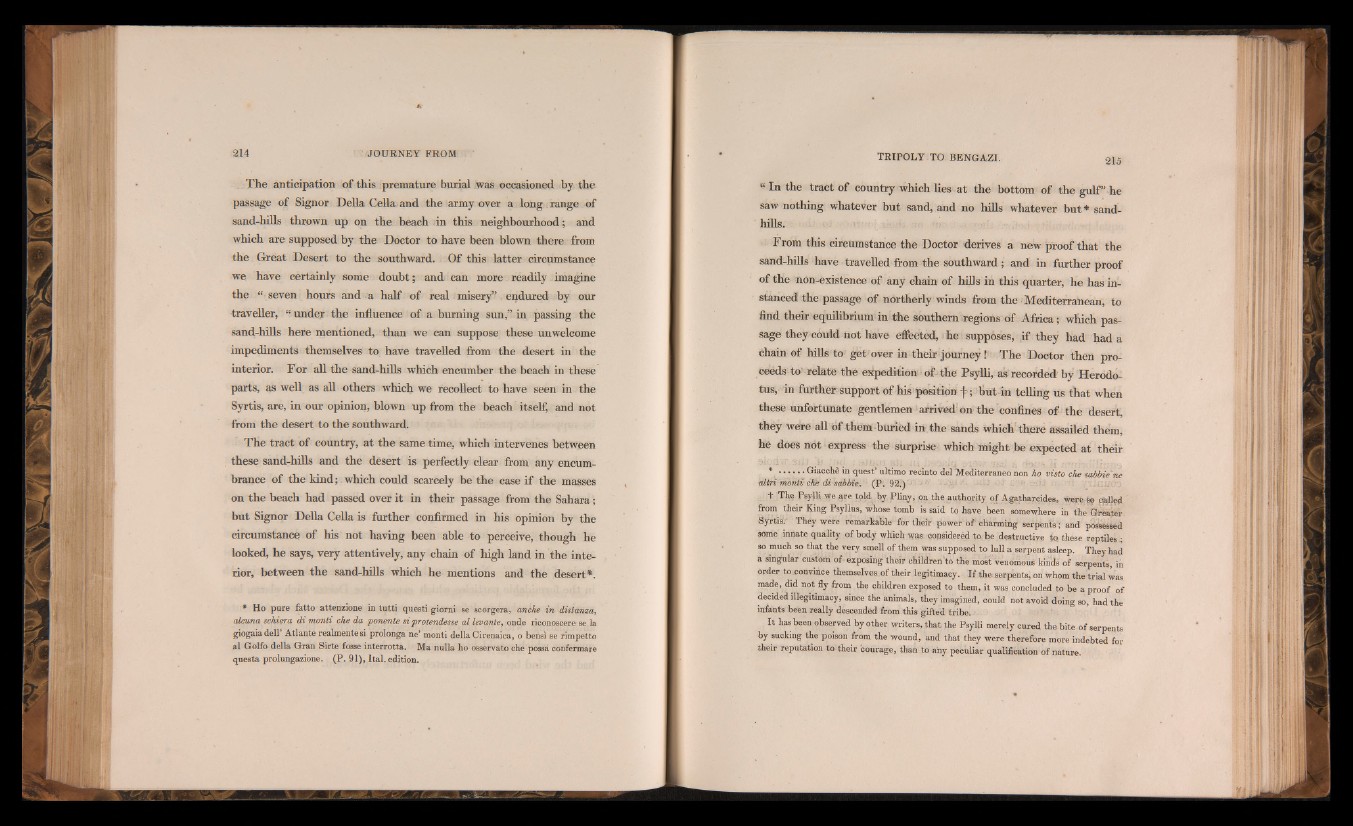
The anticipation of this premature burial was occasioned by the
passage of Signor Della Celia and the army over a long range of
sand-hills thrown up on the beach in this neighbourhood ; and
which are supposed by the Doctor to have been blown there from
the Great Desert to the southward. Of this latter circumstance
we have certainly some doubt; and can more readily imagine
the “ seven hours and a half of real misery” . endured by our
traveller, “ under the influence of a burning sun,” in passing the
sand-hills here mentioned, than we can suppose these unwelcome
impediments themselves to have travelled from the desert in the
interior. For all the sand-hills which encumber the beach in these
parts, as well as all others which we recollect to have seen in the
Syrtis, are, in our opinion, blown up from the beach itself, and not
from the desert to the southward.
The tract of country, at the same time, which intervenes between
these sand-hills and the desert is perfectly clear from any encumbrance
of the kind; .which could scarcely be the case if the masses
on the beach had passed over it in their passage from the Sahara ;
but Signor Della Celia is further confirmed in his opinion by the
circumstance of his not having been able to perceive, though he
looked, he says, very attentively, any chain of high land in the interior,
between the sand-hills which he mentions and the desert*.
* Ho pure fatto attenzione in tutti questi giorni se scorgerà, anche in distanza,
alcuna schiera di monti che da 'ponente si protendesse al levante^ onde riconoscere se la
giogaia dell Atlante realmente si prolonga ne’ monti della Cirenaica, o bensì se rim petto
al Golfo della Gran Sirte fosse interrotta. Ma nulla ho osservato che possa confermare
questa prolungazione. (P. 91), Ital. edition.
“ In the tract of country which lies at the bottom of the gulf” he
saw nothing whatever but sand, and no hills whatever but* sandhills.
I From this circumstance the Doctor derives a new proof that the
sand-hills have travelled from the southward ; and in further proof
of the non-existence of any chain of hills in this quarter, he has instanced
the passage of northerly winds from the Mediterranean, to
find their equilibrium in-the southerniregions of Africa; which passage
they could not have effected, he supposes, if they had had a
chain of hills to getover in their journey f The Doctor then proceeds
to relate thé expedition of the PsyiLi, as recorded by Herodotus,
in further support ofhis 'position f ; but in telling us that when
these unfortunate gentlemen arrived on the confines of the desert,
théy were all of them buried in the sands which there assailed them,
hé does not express the surprise which might be expected at their
* •••••■ Giacché in quest’ ultimo recinto del Mediterraneo non ho visto che sabbie'n e
altri mónti chb di-sàbbie,{* (P. 92:)
.. + S p i ï j f j l g g 3re lp j4 ty Pliny, on the authority of Agatharcides, were èo called
fr°m their King Psyllus, whose tomb is said to have been somewhere in the Greater
Syrtis/ They were remarkable fòr their power of'charming serpents; and p ressed
some innate quality of body which was considered to be destructive to, these reptiles ;
so much so that the very smell of them was supposed to lull a serpent asleep. They had
a singular custoni of - exposing their children vtò the most venomous kinds of serpents, in
order to convince themselves.of their legitimacy. If the aerpents, on whom the trial was
made, did not fly from the children exposed to them, it was concluded to be a proof of
decided illegitimacy, since the animals, they imagined, could not avoid doing so, had the
infants been really descended from this gifted tribe.
It has been observed by other writers, that the Psylli merely cured the bite of serpents
by sucking the poison from the wound, and that they were therefore more indebted for
their reputation to their courage, than to any peculiar qualification of nature.